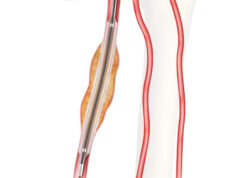 Data from the Surmodics PREVEIL early feasibility study of the company’s SurVeil drug-coated balloon (DCB) was shared in a late-breaking clinical trial presentation at the Vascular Interventional Advances meeting (VIVA; 11-14 September, Las Vegas, USA).
Data from the Surmodics PREVEIL early feasibility study of the company’s SurVeil drug-coated balloon (DCB) was shared in a late-breaking clinical trial presentation at the Vascular Interventional Advances meeting (VIVA; 11-14 September, Las Vegas, USA).
PREVEIL is a prospective, US, multicentre, single-arm trial designed to assess the safety and feasibility of the SurVeil DCB in the treatment of subjects with symptomatic peripheral artery disease (PAD) due to de novo lesions of the femoral and popliteal arteries.
Gary Ansel (OhioHealth, Columbus, Ohio) presented six-month results from 13 patients (Rutherford class 2 to 4) at three clinical sites who were treated with the SurVeil DCB. Average lesion length was 56mm. Clinical assessments included primary patency and late lumen loss through six months, plasma paclitaxel levels, and changes in Rutherford classification, resting ankle brachial index/toe brachial index (ABI/TBI), six-minute walk test, and walking impairment questionnaire (WIQ) at one, six, 12, 24 and 36 months. Key secondary safety endpoints included freedom from major vascular complications, evidence of paclitaxel toxicity, or thrombolysis in myocardial infarction.
Data from the study show that acute success measures of safety were achieved in 100% of subjects. Results also showed primary patency of 100% and mean late lumen loss of 0.27±0.54mm at six months. Significant improvement in Rutherford classification, ABI/TBI, six-minute walk test, and WIQ were seen at 30 days and six months. Median paclitaxel plasma concentration peaked immediately post-procedure (Cmax 1.07ng/mL) and was undetectable at 30 days. Secondary technical, device, and procedure success criteria were achieved.
“We are encouraged by the early patient data using the Surmodics SurVeil DCB platform and are excited to continue clinical evaluation of the product in the US pivotal trial,” said Ansel, who is a principal investigator in both the PREVEIL trial and the SurVeil DCB pivotal trial, TRANSCEND.
“Our goal with the SurVeil DCB is to improve drug transfer and effect on the arterial wall with a lower drug dose and a reduction in the amount of drug reaching tissue outside the area of treatment,” said Gary Maharaj, president and CEO of Surmodics. “We are very satisfied with the results of the EFS and believe they are consistent with our encouraging pre-clinical data.”













